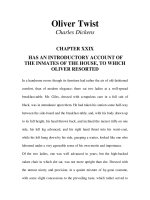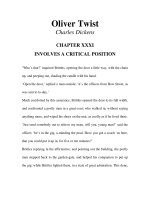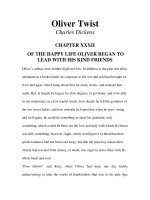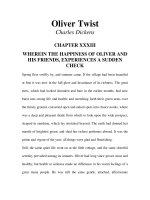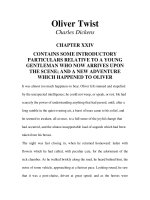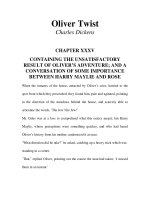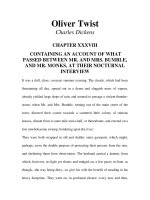Tài liệu LUYỆN ĐỌC TIẾNG ANH QUA TÁC PHẨM VĂN HỌC-SHORT STORY BY O’HENRY A Technical Error doc
Bạn đang xem bản rút gọn của tài liệu. Xem và tải ngay bản đầy đủ của tài liệu tại đây (26.58 KB, 10 trang )
SHORT STORY BY O’HENRY
A Technical Error
I never cared especially for feuds, believing them to be even more overrated
products of our country than grapefruit, scrapple, or honeymoons.
Nevertheless, if I may be allowed, I will tell you of an Indian Territory feud
of which I was press-agent, camp-follower, and inaccessory during the fact.
I was on a visit to Sam Durkee's ranch, where I had a great time falling off
unmanicured ponies and waving my bare hand at the lower jaws of wolves
about two miles away. Sam was a hardened person of about twenty- five,
with a reputation for going home in the dark with perfect equanimity, though
often with reluctance.
Over in the Creek Nation was a family bearing the name of Tatum. I was
told that the Durkees and Tatums had been feuding for years. Several of
each family had bitten the grass, and it was expected that more
Nebuchadnezzars would follow. A younger generation of each family was
growing up, and the grass was keeping pace with them. But I gathered that
they had fought fairly; that they had not lain in cornfields and aimed at the
division of their enemies' suspenders in the back -- partly, perhaps, because
there were no cornfields, and nobody wore more than one suspender. Nor
had any woman or child of either house ever been harmed. In those days --
and you will find it so yet -- their women were safe.
Sam Durkee had a girl. (If it were an all-fiction magazine that I expect to sell
this story to, I should say, "Mr. Durkee rejoiced in a fiancée.") Her name
was Ella Baynes. They appeared to be devoted to each other, and to have
perfect confidence in each other, as all couples do who are and have or aren't
and haven't. She was tolerably pretty, with a heavy mass of brown hair that
helped her along. He introduced me to her, which seemed not to lessen her
preference for him; so I reasoned that they were surely soul-mates.
Miss Baynes lived in Kingfisher, twenty miles from the ranch. Sam lived on
a gallop between the two places.
One day there came to Kingfisher a courageous young man, rather small,
with smooth face and regular features. He made many inquiries about the
business of the town, and especially of the inhabitants cognominally. He said
he was from Muscogee, and he looked it, with his yellow shoes and
crocheted four-in-hand. I met him once when I rode in for the mail. He said
his name was Beverly Travers, which seemed rather improbable.
There were active times on the ranch, just then, and Sam was too busy to go
to town often. As an incompetent and generally worthless guest, it devolved
upon me to ride in for little things such as post cards, barrels of flour,
baking-powder, smoking-tobacco, and -- letters from Ella.
One day, when I was messenger for half a gross of cigarette papers and a
couple of wagon tires, I saw the alleged Beverly Travers in a yellow-
wheeled buggy with Ella Baynes, driving about town as ostentatiously as the
black, waxy mud would permit. I knew that this information would bring no
balm of Gilead to Sam's soul, so I refrained from including it in the news of
the city that I retailed on my return. But on the next afternoon an elongated
ex-cowboy of the name of Simmons, an oldtime pal of Sam's, who kept a
feed store in Kingfisher, rode out to the ranch and rolled and burned many
cigarettes before he would talk. When he did make oration, his words were
these:
"Say, Sam, there's been a description of a galoot miscallin' himself Bevel-
edged Travels impairing the atmospheric air of Kingfisher for the past two
weeks. You know who he was? He was not otherwise than Ben Tatum, from
the Creek Nation, son of old Gopher Tatum that your Uncle Newt shot last
February. You know what he done this morning? He killed your brother
Lester -- shot him in the co't-house yard."
I wondered if Sam had heard. He pulled a twig from a mesquite bush,
chewed it gravely, and said:
"He did, did he? He killed Lester?"
"The same," said Simmons. "And he did more. He run away with your girl,
the same as to say Miss Ella Baynes. I thought you might like to know, so I
rode out to impart the information."
"I am much obliged, Jim," said Sam, taking the chewed twig from his
mouth. "Yes, I'm glad you rode Out. Yes, I'm right glad."
"Well, I'll be ridin' back, I reckon. That boy I left in the feed store don't
know hay from oats. He shot Lester in the back."
"Shot him in the back?"
"Yes, while he was hitchin' his hoss."
"I'm much obliged, Jim."
"I kind of thought you'd like to know as soon as you could."
"Come in and have some coffee before you ride back, Jim?"
"Why, no, I reckon not; I must get back to the store."
"And you say -- "
"Yes, Sam. Everybody seen 'em drive away together in a buckboard, with a
big bundle, like clothes, tied up in the back of it. He was drivin' the team he
brought over with him from Muscogee. They'll be hard to overtake right
away."
"And which -- "
"I was goin' on to tell you. They left on the Guthrie road; but there's no
tellin' which forks they'll take -- you know that."
"All right, Jim; much obliged."
"You're welcome, Sam."
Simmons rolled a cigarette and stabbed his pony with both heels. Twenty
yards away he reined up and called back:
"You don't want no -- assistance, as you might say?"
"Not any, thanks."
"I didn't think you would. Well, so long!"
Sam took out and opened a bone-handled pocket-knife and scraped a dried
piece of mud from his left boot. I thought at first he was going to swear a
vendetta on the blade of it, or recite "The Gipsy's Curse." The few feuds I
had ever seen or read about usually opened that way. This one seemed to be
presented with a new treatment. Thus offered on the stage, it would have
been hissed off, and one of Belasco's thrilling melodramas demanded
instead.
"I wonder," said Sam, with a profoundly thoughtful expression, "if the cook
has any cold beans left over!"
He called Wash, the Negro cook, and finding that he had some, ordered him
to heat up the pot and make some strong coffee. Then we went into Sam's
private room, where he slept, and kept his armoury, dogs, and the saddles of
his favourite mounts. He took three or four six-shooters out of a bookcase
and began to look them over, whistling "The Cowboy's Lament"

